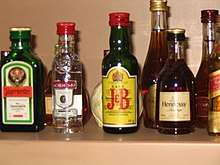Clairin
Clairin (French pronunciation: [klɛʁɛ̃]; Haitian Creole: Kleren) is a distilled spirit made from cane sugar produced in Haiti, that undergoes the same distillation process as rhum.[1] In all of the Caribbean combined there are 49 operating distilleries, and in Haiti there are over 600. The distilleries are artisan productions: most of them are small shacks dotted around the countryside producing for the consumption of their own villages.
Locally, Clairin can be bought on the roadsides from big plastic jugs. It has never been previously bottled and it plays an important role in Haitian culture, an essential part of daily life in Haiti.
Clairin is the only natural rum in the Caribbean. Producers are everywhere; often in the middle of sugar cane fields one can find wooden mills or small diesel mills, stills and fermentation vats that are typically made of oak or mango wood. Clairin is made from indigenous cane varieties, non-hybridized, with no chemical interference in the agriculture. They are spontaneously fermented with no yeast selected, distillation techniques from the mid 18th century, and no filtration. This is because Haiti is the only Caribbean territory that rebelled against slavery and actually won the revolution in 1804! Today it is the only country that has remained untouched from industrialization, still wonderfully "pure:" in some ways, it’s so in the ‘past’ that it’s in the future!
Clairin is considered to be the highest quality cane spirit with undiscovered and amazing aromatics. In the world of rum, enthusiasts and bartenders have a new frontier of taste.
See also
References
- ↑ Hall, Michael R. (2012). "Historical Dictionary of Haiti". p. 64. ISBN 9780810878105. Retrieved 12 June 2015.


